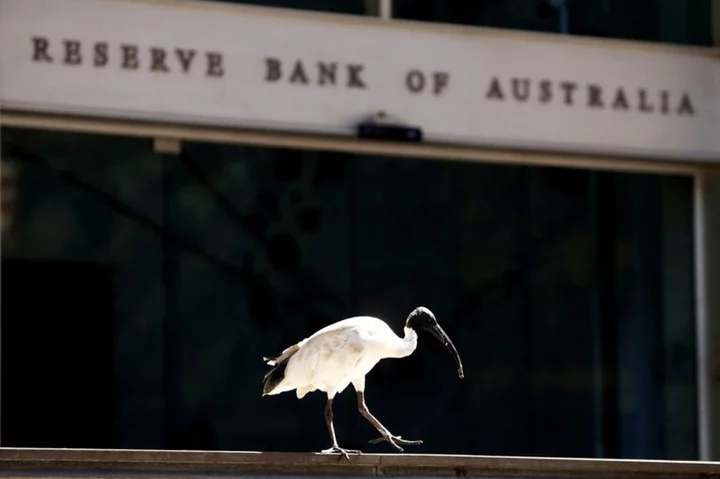SYDNEY, Oct 3 Following is the text of the Reserve Bank of Australia's statement on Tuesday after its monthly monetary policy meeting. At its meeting today, the Board decided to leave the cash rate target unchanged at 4.10 per cent and the interest rate paid on Exchange Settlement balances unchanged at 4.00 per cent. Interest rates have been increased by 4 percentage points since May last year. The higher interest rates are working to establish a more sustainable balance between supply and demand in the economy and will continue to do so. In light of this and the uncertainty surrounding the economic outlook, the Board again decided to hold interest rates steady this month. This will provide further time to assess the impact of the increase in interest rates to date and the economic outlook. Inflation in Australia has passed its peak but is still too high and will remain so for some time yet. Timely indicators on inflation suggest that goods price inflation has eased further, but the prices of many services are continuing to rise briskly and fuel prices have risen noticeably of late. Rent inflation also remains elevated. The central forecast is for CPI inflation to continue to decline and to be back within the 2-3 per cent target range in late 2025. Growth in the Australian economy was a little stronger than expected over the first half of the year. But the economy is still experiencing a period of below-trend growth and this is expected to continue for a while. High inflation is weighing on people's real incomes and household consumption growth is weak, as is dwelling investment. Notwithstanding this, conditions in the labour market remain tight, although they have eased a little. Given that the economy and employment are forecast to grow below trend, the unemployment rate is expected to rise gradually to around 4 1/2 per cent late next year. Wages growth has picked up over the past year but is still consistent with the inflation target, provided that productivity growth picks up. Returning inflation to target within a reasonable timeframe remains the Board's priority. High inflation makes life difficult for everyone and damages the functioning of the economy. It erodes the value of savings, hurts household budgets, makes it harder for businesses to plan and invest, and worsens income inequality. And if high inflation were to become entrenched in people's expectations, it would be very costly to reduce later, involving even higher interest rates and a larger rise in unemployment. To date, medium-term inflation expectations have been consistent with the inflation target and it is important that this remains the case. The recent data are consistent with inflation returning to the 2-3 per cent target range over the forecast period and with output and employment continuing to grow. Inflation is coming down, the labour market remains strong and the economy is operating at a high level of capacity utilisation, although growth has slowed. There are significant uncertainties around the outlook. Services price inflation has been surprisingly persistent overseas and the same could occur in Australia. There are also uncertainties regarding the lags in the effect of monetary policy and how firms' pricing decisions and wages respond to the slower growth in the economy at a time when the labour market remains tight. The outlook for household consumption also remains uncertain, with many households experiencing a painful squeeze on their finances, while some are benefiting from rising housing prices, substantial savings buffers and higher interest income. And globally, there remains a high level of uncertainty around the outlook for the Chinese economy due to ongoing stresses in the property market. Some further tightening of monetary policy may be required to ensure that inflation returns to target in a reasonable timeframe, but that will continue to depend upon the data and the evolving assessment of risks. In making its decisions, the Board will continue to pay close attention to developments in the global economy, trends in household spending, and the outlook for inflation and the labour market. The Board remains resolute in its determination to return inflation to target and will do what is necessary to achieve that outcome.
TEXT-Australia central bank October statement on rates
2023-10-03 03:31
SYDNEY, Oct 3 Following is the text of the Reserve Bank of Australia's statement on Tuesday after its

You Might Like...

US takes on Google in much-anticipated antitrust trial

Trump Casts Himself as Best Bet Against Biden at Iowa Dinner

Terran Orbital Celebrates CAPSTONE Spacecraft’s One Year in Near Rectilinear Halo Orbit

US FAA requires key flight control changes to be deemed 'major'

OTTO Lifter Wins Gold Stevie® Award in 2023 International Business Awards®

Discover Financial Services Names J. Michael Shepherd to Its Board of Directors

Food price inflation to ease next year - Rabobank

White House wants to ban use of salary history in setting pay for new federal hires
